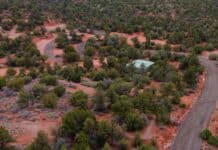With the passing of Senate Bill 1382 will come additional tax dollars to the state, eventually trickling down to the communities that offer short-term vacation rentals.
But just how much money that equates is yet to be determined.
The Sedona-generated law will require all online lodging marketplaces such as Airbnb, Home Away and VRBO to remit state and local taxes for short-term rentals on behalf of their hosts in Arizona. A similar bill was just passed in Idaho.
Airbnb volunteered to do last year what SB 1382 will now require as of Tuesday, Jan. 1, 2019, in terms of collecting taxes for its hosts.
“Airbnb has partnered with hundreds of governments throughout the world to collect and remit taxes, streamlining the process for hosts while contributing meaningful revenue to communities,” Airbnb spokeswoman Laura Rillos told the Sedona Red Rock News. “Collecting and remitting occupancy taxes, which were designed for traditional hospitality providers with teams of lawyers and accountants, can be complicated for hosts, and we are glad our partnership with the state of Arizona can make this easier for everyone.”
Airbnb, the largest online short-term rental marketplace, announced that its hosts generated $11.5 million in tax revenue in Arizona in 2017. These same hosts earned a combined $94.9 million while welcoming more than 646,000 guest arrivals to the state.
“I think that those figures illustrate the positive impact that increased collection will have on both state and local revenues,” Sedona City Attorney Robert Pickels said.
State law already requires short-term vacation rental owners to apply with Arizona Department of Revenue for a license to collect and remit state and local taxes in cities or towns that impose a municipal privilege tax. Pickels said many short-term vacation rental owners not using Airbnb are not registered with ADOR to collect and remit these taxes.
How much of that $11.5 million went back to Sedona is not public information.
“Sales tax information is confidential,” Sedona Finance Director Cherie Wright said. “While Airbnb collects tax for multiple clients, it would also be disclosing information about Airbnb’s business that isn’t allowed.”
When asked if she could provide the aggregate tax total of all short-term vacation rentals in 2017, Wright said that, too, is confidential.
“We cannot disclose categories with either a small number of taxpayers, or a category with a small number of taxpayers that represent a significant portion of the total,” she said. “The state says that is too close to providing individual business information, which could possibility be discerned from those small categories.”
And while Airbnb can disclose specific dollar amounts, Rillos said she did not have figures broken down into each individual city.
Airbnb also announced that in 2017 — the first year in which all Arizona cities were required to allow short-term vacation rentals — the typical host earned $6,100, and each listing was booked an average of 50 nights a year. These figures may be much higher in Sedona since many of the estimated 1,000 short-term rentals are not the homeowner’s primary residence.
“More Arizona residents are sharing their homes as a way to earn a little extra money to make ends meet,” Rillos said. “While many of our hosts say they first turned to home sharing for financial reasons, they continue hosting because they love meeting people from around the world and introducing them to their communities.
“At the same time, the way people are traveling is changing. More visitors traveling to Arizona are looking for authentic experiences and want to stay in neighborhoods, rather than typical tourist areas.”
There are now more than 10,000 Airbnb hosts throughout Arizona, something Gov. Doug Ducey sees as a benefit.
“Airbnb’s presence in the state has sparked positive economic impacts and given tourists more options when planning their trips,” Ducey said in a statement.
Ron Eland can be reached at 282-7795 ext. 122 or by email at reland@larsonnewspapers.com


















